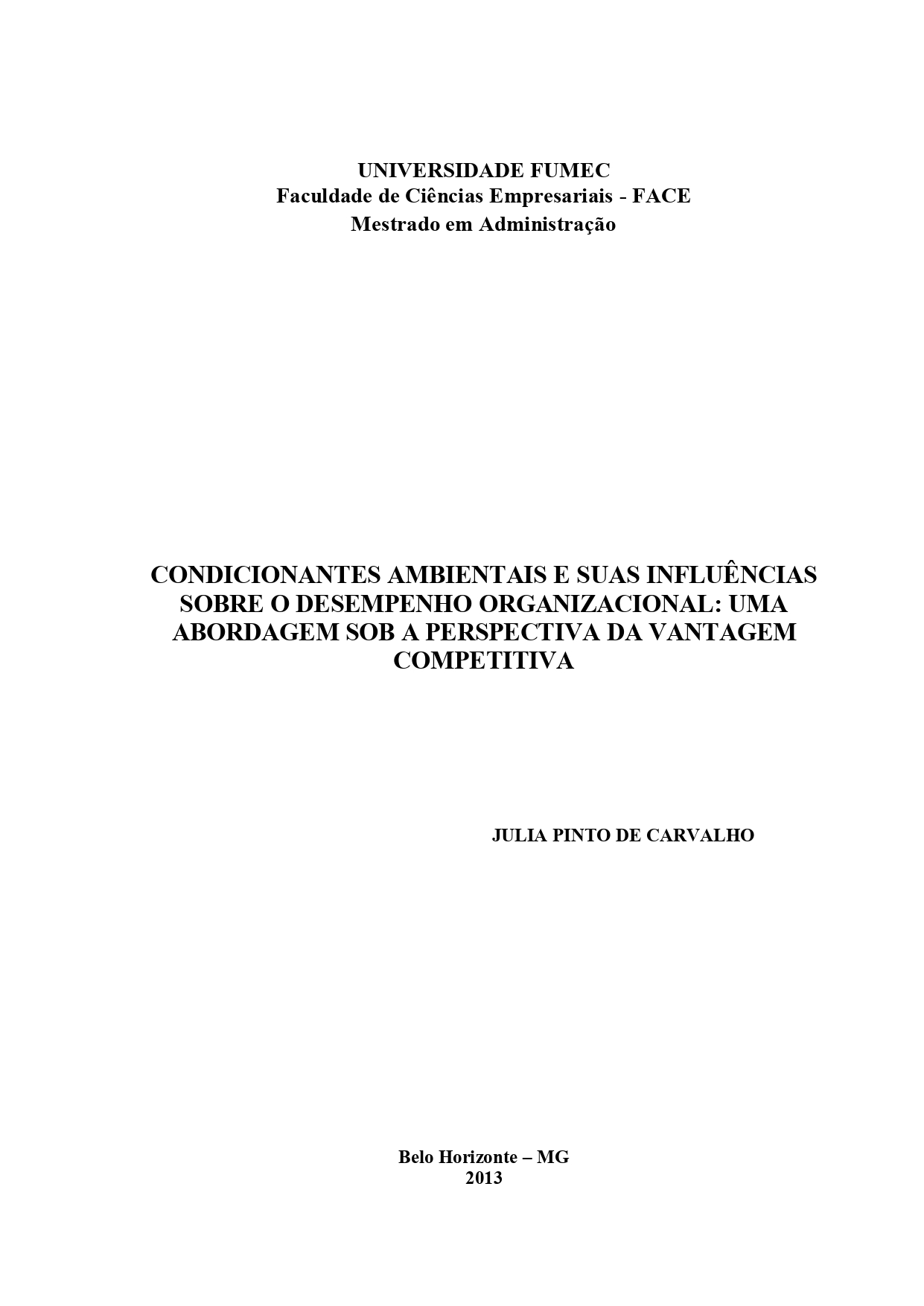Condicionantes ambientais e suas influências sobre o desempenho organizacional: uma abordagem sob a perspectiva da vantagem competitiva

Visualizar/
Data
2013Autor
Carvalho, Julia Pinto de
xmlui.mirage2.itemSummaryView.MetaData
Mostrar registro completoResumo
O propósito desta pesquisa é o de investigar o efeito que o ambiente da indústria exerce sobre o desempenho da firma. A necessidade de se investigar o desempenho organizacional é um consenso nos estudos empíricos e teóricos em estratégia, havendo, no entanto, uma dificuldade na composição desse constructo, haja vista sua multidimensionalidade. Para tanto, adotou-se, nesta pesquisa, os constructos lucratividade e crescimento como representativos do desempenho organizacional, ambos parte do processo de criação de valor, gerador de Vantagem Competitiva, conceito utilizado como embasamento teórico desta dissertação. Compuseram a amostra 327 empresas brasileiras de capital aberto, com ações negociadas na bolsa de valores, no período de 2005 a 2012. Foram propostos dois modelos empíricos: um associando a lucratividade com o ambiente da indústria e outro associando o crescimento com o ambiente da indústria. A análise foi efetuada longitudinalmente, sendo um modelo para cada período analisado e os resultados, posteriormente, foram comparados. Esses resultados deixaram claro o impacto que o ambiente da indústria, com toda sua diversidade, efetua sobre o desempenho representado em termos da lucratividade da firma. Esse efeito, que vem crescendo claramente com o passar dos anos, trata do valor apropriado pela firma, ou seja, do lucro, e refere-se à criação de valor mais fácil de ser compreendida em um processo produtivo que relaciona o custo de produção com o preço de venda praticado junto ao cliente. Além de identificar o efeito crescente do ambiente da indústria sobre a lucratividade, os resultados do estudo focaram a importância do bom senso das ações estratégicas, por meio da detectada não linearidade dessa relação. A relação quadrática identificada aponta para a existência de um ponto de equilíbrio do ambiente da indústria que, caso ultrapassado, provoca efeito inverso na lucratividade, podendo, até mesmo, culminar em prejuízo para a firma. Acerca do efeito do ambiente da indústria sobre o crescimento, enquanto representativo do desempenho, apesar de variar entre 2,8% e 3,3%, não apresentou significância estatística. Também não houve uma sustentabilidade no comportamento dos modelos construídos ao longo do tempo, o que possibilita duas conclusões. Primeiramente, a imediata, de que o ambiente da indústria não impacta sobre o desempenho da firma, o que de fato, em termos de hipótese de pesquisa, é a conclusão plausível. Além disso, entretanto, deve-se ter em mente a complexidade da natureza do constructo crescimento, com sua imprevisibilidade e aleatoriedade, assunto que ainda deve ser abordado com maior profundidade pelos estudiosos da área. The goal of this research is to investigate the effect of the industrial environment over the firm performance. The necessity to investigate the organizational performance is an agreement in the empiric and theoretical in strategy, having, however, difficulties in this construct composition, considering its multidimensionality. For such, in this research, the constructs profitability and growing were adopted as representative of the organizational performance, both part of the value creation process, competitive advantage generator, concept used as theoretical basement of this dissertation. The sample was composed by 327 Brazilian companies with opened capital, with shares negotiated at the stock exchange, from 2005 to 2012. Two empirical models were proposed: first associating the profitability with the industrial environment, and second associating the growth with the industrial environment. The analysis was made longitudinally, being one model for each period analyzed and the results, later on, compared. These results made clear the impact that the industrial environment, with all its diversity, causes over the performance represented in terms of the company profitability. This effect, which has been growing clearly with the years, treats the value appropriate by the company, that is, the profit, and refers to the creation of the easier value to be understood in a productive process that relates the production cost with the sale price used with the client. Besides identifying the growing effect of the industrial environment over the profitability, the results of this work focused on the importance of the commons sense of the strategic actions, through the non-linearity detected in this relation. The quadratic relation identified points to the existence of a balance point of the industrial environment that, if overpassed, causes an inverted effect in the profitability, being able even of culminating in a loss for the company. About the industrial environment effect over the growth, while performance representative, though changing from 2.8% and 3.3%, it did not show statistical significance. There was not also sustainability in the models built throughout time, which makes two conclusions possible. First, the immediate one, that the industrial environment does not impact the company performance, which in fact, in terms of research hypothesis, is the plausible conclusion. Besides, however, it’s necessary to keep in mind the complexity of the growth construct nature, with its unpredictability and randomness, a subject that must be addressed with greater deepness by the experts on this area.
